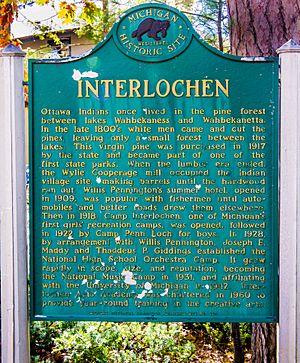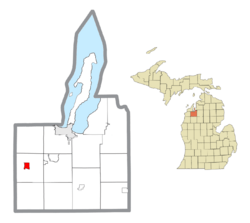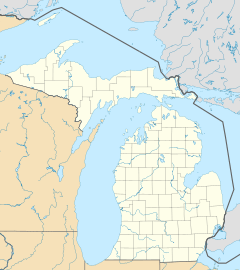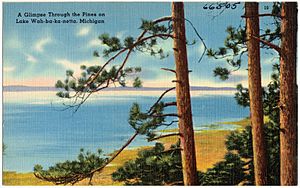Interlochen, Michigan facts for kids
Quick facts for kids
Interlochen, Michigan
|
|
|---|---|

Interlochen Historical Marker
|
|
| Motto(s):
"Between the Lakes"
|
|

Location within Grand Traverse County
|
|
| Country | |
| State | |
| County | |
| Township | Green Lake |
| Area | |
| • Total | 1.27 sq mi (3.29 km2) |
| • Land | 1.24 sq mi (3.21 km2) |
| • Water | 0.03 sq mi (0.08 km2) |
| Elevation | 840 ft (256 m) |
| Population
(2020)
|
|
| • Total | 694 |
| • Density | 559.23/sq mi (216.00/km2) |
| Time zone | UTC-5 (Eastern (EST)) |
| • Summer (DST) | UTC-4 (EDT) |
| ZIP Code |
49643
|
| Area code(s) | 231 |
| GNIS feature ID | 629053 |
| FIPS code | 26-40800 |
Interlochen is a small community in Grand Traverse County, Michigan, in the United States. Its name means "between the lakes." It is located between Duck Lake and Green Lake.
In 2020, about 694 people lived there. Interlochen is famous for the Interlochen Center for the Arts, a well-known school and summer camp for young artists. It is also home to Interlochen State Park, which was Michigan's first state park.
Contents
History of Interlochen
How Interlochen Got Its Name
The name "Interlochen" comes from two words. "Inter" is Latin for "between," and "lochen" is a Scottish Gaelic word for "lakes." So, Interlochen means "between the lakes."
Early Days and Logging
Before European settlers arrived, the Odawa people lived here. They called the two lakes Wahbekaness (now Duck Lake) and Wahbekanetta (now Green Lake).
In the late 1800s, European settlers came to the area. They started logging (cutting down trees) and fishing. A small village called Wylie was founded about a mile south of where Interlochen is today.
Railroads were built to help move the lumber. The Manistee and North-Eastern Railroad arrived in 1889, and the Chicago and West Michigan Railway came in 1890. These two train lines crossed in what is now downtown Interlochen.
Pine Park and State Park
As more trees were cut down, people worried about losing the beautiful forests. A company called Buckley and Douglas Lumber Company saved 186 acres of old pine trees between Duck and Green lakes. This area was called Pine Park. It was a place where people could relax and enjoy nature. A small train station called Pine Park Station was built there.
Many visitors came to camp, fish, boat, and escape city heat. In 1909, a hotel called the Pennington Hotel opened near Pine Park.
By the mid-1910s, people wanted to protect Pine Park forever. The state of Michigan bought the land in 1917 for $60,000. It was first called The Pines and later became Interlochen State Park. This was the first state park created by Michigan itself.
Interlochen Center for the Arts
In 1928, a special music camp was started by Joseph E. Maddy just south of Interlochen. It was called the National High School Orchestra Camp. Over time, this camp grew into the famous Interlochen Center for the Arts. Today, it includes a summer camp, a boarding high school for arts students, and a public radio station.
The railroads that once brought people and lumber to Interlochen were removed in the 1930s and 1980s. But Interlochen is still a very popular place for vacations. People enjoy hiking, fishing, camping, boating, swimming, cross-country skiing, and snowmobiling.
Geography
Interlochen is located in the Betsie River watershed. The community covers about 1.27 square miles (3.29 square kilometers). Most of this area is land, with a small part being water.
Education
Public Schools in Interlochen
Students in Interlochen attend schools in the Traverse City Area Public Schools district (TCAPS).
The closest public high school is Traverse City West Senior High School. Before 2016, there was an Interlochen Elementary School. Now, younger students go to Blair Elementary School near Grawn, or Silver Lake and Westwoods Elementary Schools near Traverse City.
Media
Interlochen is home to 88.7 WIAA, a radio station run by the Interlochen Center for the Arts. It is the local National Public Radio station for Northern Michigan.
Transportation
Main Roads
- US 31 runs through the northern part of Interlochen.
- M-137, now called J. Maddy Parkway, was a state highway from 1930 to 2020.
Public Transport
Interlochen has public transportation provided by the Bay Area Transportation Authority (BATA). BATA serves most of the Grand Traverse area with dial-a-ride services. This means you can call for a bus to pick you up. BATA also connects riders to the Greyhound bus terminal for longer trips.
In 2011, BATA started a fun program for students. They offer rentable skateboards, scooters, bicycles, and even cross-country skis in winter!
Local Airport
Population
| Historical population | |||
|---|---|---|---|
| Census | Pop. | %± | |
| 2010 | 583 | — | |
| 2020 | 694 | 19.0% | |
| U.S. Decennial Census | |||
In 2010, there were 583 people living in Interlochen. By 2020, the population grew to 694 people.
Most people in Interlochen are White (95.2%). There are also Native American, African-American, and other groups. About 1.9% of the population is Hispanic or Latino.
The median age in Interlochen in 2010 was about 32 years old. This means half the people were younger than 32, and half were older.
See also
 In Spanish: Interlochen (Míchigan) para niños
In Spanish: Interlochen (Míchigan) para niños
 | Delilah Pierce |
 | Gordon Parks |
 | Augusta Savage |
 | Charles Ethan Porter |




